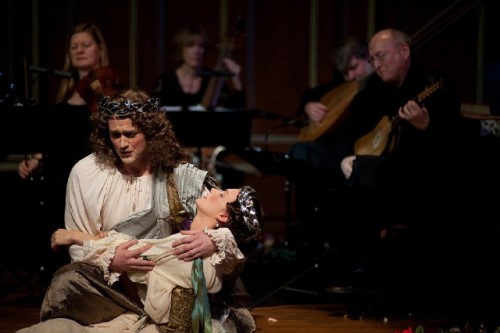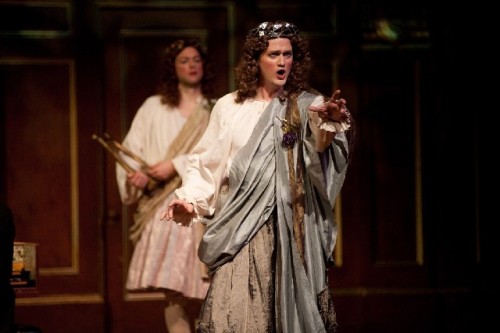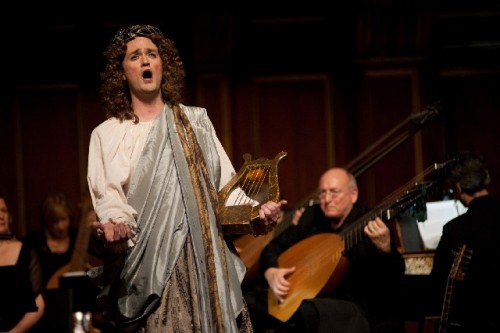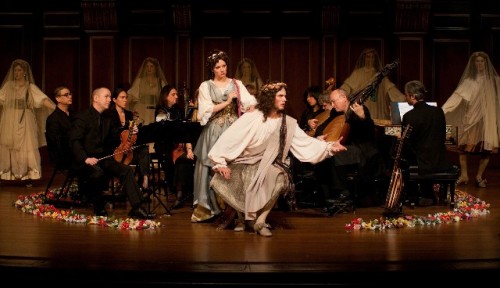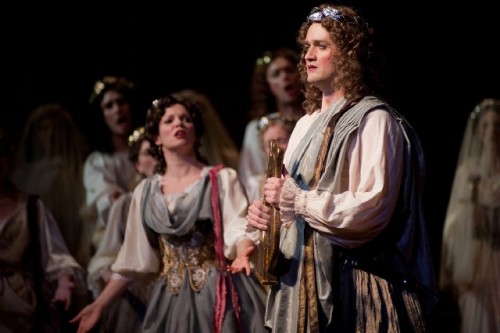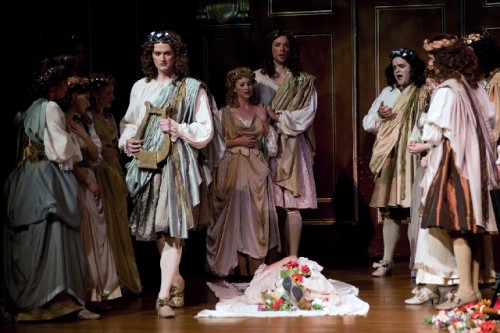Orpheus Doesn't Look Back
Boston Early Music Festival Presents French Rarity
By: David Bonetti - Nov 28, 2011
La Descente d’Orphee aux Enfers
and La Couronne de Fleurs
by Marc-Antoine Charpentier
Boston Early Music Festival
Jordan Hall
November 26 & 27
Production Team:
Paul O’Dette and Stephen Stubbs, Musical Directors
Gilbert Blin, Stage Director
Anna Watkins, Costume Designer
Melinda Sullivan, Choreographer
Robert Mealy, Concertmaster
Cast:
(La Descente d’Orphee)
Orphee, Aaron Sheehan
Euridice: Carrie Henneman Shaw
Apollon: Olivier Laquerre
Ixion: Jason McStoots
Tantale: Michael Kelly
Titye: Olivier Laquerre
Pluton: Douglas Williams
Proserpine: Mireille Asselin
Additional Nymphs, Shepherds, Shades: Megan Stapleton, Brenna Wells, Caitlin Klinger, Thea Lobo, Alexis Silver, Carlos Fittante, Olsi Gjeci.
Cast:
(La Couronne de Fleurs)
Flore: Mireille Asselin
Dancing Shepherds and Shepherdesses: Carlos Fittante, Olsi Gjeci, Caitlin Klinger, Alexis Silver
Shepherds: Jason McStoots, Michael Kelly, Douglas Williams, Olivier Laquerre, Aaron Sheehan
Shepherdesses: Carrie Henneman Shaw, Brenna Wells, Thea Lobo, Megan Stapleton
The fall opera season in Boston ended on a high note. Not unexpectedly, the Boston Early Music Festival pastiche of two obscure operas by Marc-Antoine Charpentier (1643-1704) was the best – in the sense of most theatrically and musically compelling– opera presentation I saw from September until the holiday hiatus. (The Gershwins’ Porgy and Bess at the A.R.T and Candide at the Huntington Theater also scored high, but the latter is not an opera and the former was not presented as such.) During the two years I’ve been covering the local opera scene, the two early music groups, the BEMF and Boston Baroque, have succeeded in putting on enjoyable, sometimes great, always memorable evenings of music-theater, often semi-staged. One hopes that the other local companies, which cover the entire range of opera from its invention to the day before yesterday, have been paying attention. They struggle to get it right and often don’t succeed. (Granted, they put on fully staged productions, which are more challenging.)
To be sure, although the BEMF’s track record is reassuring, the prospect of hearing two different works hobbled together was not terribly promising. Charpentier’s attempt at retelling the Orpheus myth lacks a final act, ending the action with Orpheus leading Eurydice out of Hades before the fateful glance back. And his flower festival pastoral is one of those flattering paeans to the French king, this one Louis XIV, which French composers were required to produce if they wanted royal patronage. (Charpentier nonetheless went without the royal seal of approval.) The Revolution didn’t come a moment too soon if you ask me.
Still, I should have had faith in stage director Gilbert Blin’s ability to whip up a delicious souffle out of suspect eggs. And I should have had faith in the BEMF orchestra, led as always with elegance and stylishness by Paul O’Dette and Stephen Stubbs. And most of all, I should have had faith in the cast of young singers, many of them Boston-based or -associated that the BEMF has built over the past few years into an ensemble that has no superior among American early music groups.
In other words, it was a delightful evening. I was even won over by the frivolous La Courrone de Fleurs. In such an unsubstantial work, Anna Watkins’ beautiful (as always) costumes and Melanie Sullivan’s lively dances went a long way to making the work enjoyable.
But it was Blin that made it come together. La Descente d’Orphee has remained ignored even during the worldwide early music revival because it is a truncated work. Yet it has some powerful and passionate arias and ensembles, notably Orpheus’s lament over the dead body of his betrothed and the trio between Orpheus, Pluto, the god of the underworld, and Proserpine, his wife, over Eurydice’s fate. Presented by itself, it is not a full evening’s work and it concludes abruptly – we all know how the story ends and it leaves us (not to mention Orpheus and Eurydice) hanging at the end of the second act.
La Couronne de Fleurs to the rescue. The silly work has some lovely music, which is a pleasure to hear, especially with the BEMF forces. It is basically a song contest – think Thannhauser. One shepherd after another sings Louis’s praises in hope of winning the crown of flowers of the title. At the end Flore, who oversees the proceedings, decides that everyone was equally good – shades of Lake Woebegone – and shares the crown to general rejoicing.
Blin transported La Descente d’Orphee wholesale into the pastoral as one of the songs in the contest. The initial transition is seamless and after Orpheus leads Eurydice out of Hades, Blin has a man in 17th century costume – probably meant to be Jean-Baptiste Lully (1632-1687), Charpentier’s main rival and the king’s favorite – come in and say silently, but in effect, ‘Enough, already! Time to wrap it up’
Of course, as seamless as the melding of the two works is logistically, they wed together less well dramatically. The pastoral is light and aims to do no more than entertain. The Orpheus and Eurydice myth is tragic and deals with death, separation, redemption and finally despair in the face of fate. When one of the shepherdesses who had been so carefree suddenly pricks her finger and dies, it is a jolt, and when Orpheus, powerfully if sweetly sung by tenor Aaron Sheehan, laments over her body, we are quickly transported to a world of real emotions. The Et in Arcadio Ego theme is common enough in pastoral poetry and art: two of Poussin’s greatest paintings commemorate the moment when innocent shepherds discover that death exists even in Arcadia. But here the surprise might be a little too much. Still, we get over the transition quickly, gladly accepting it because it allows a wonderful new work to come into being.
Yes, the BEMF essentially presented a new work, a pastiche of two disparate pieces the composer had no intention of seeing combined into one. That might seem sacrilege, especially in the early music world, in which authenticity is the ruling passion. But pastiches have always existed; indeed they flourished during the 17th and 18th centuries when composers eagerly plundered their own and others’ works to create something new often when faced with an impending opening night. Later this season, the Metropolitan Opera, which has not presented many early operas – just as well with its enormous barn of a hall – is putting on a pastiche of work by Handel, Vivaldi and others assembled by none other than William Christie, one of the fathers of the early music opera revival.
As I mentioned earlier, the BEMF has assembled a group of talented young singers that are unequalled, at least in the United States, and they seem to get better with every outing. Hearing them, I can’t help but be reminded of that group of singers that came together 30 years ago at Emmanuel Church under the guidance of Craig Smith. Among them, Lorraine Hunt went on to international stardom, but Sanford Sylvan, James Maddalena and others also achieved fame in the larger opera world.
The night belonged to Aaron Sheehan who has become a first rate dramatic tenor in the early music opera repertory. He showed himself particularly adept at declaiming the expository lines characteristic of text-determined French opera, his natural sweetness wedded to something more steely. His mournful aria over the dead Eurydice sent chills up the spine.
As Pluto, Douglas Williams was also outstanding. A bass with astonishing agility, he sang with regal authority as the god of the underworld. He nursed at least five nuances out of every syllable of the phrase, “le silence eternel,” when he questions who does Orpheus think he is disturbing his peace. But when his wife, seconding Orpheus’s argument that she would be back in due time since no one escapes death, convinced him to let Eurydice go, his physical demeanor and his voice melted into tenderness. A great performance.
That trio over Eurydice’s fate between Orpheus, Pluto and Proserpine, ably sung by Mireille Asselin, was the opera’s core. Exemplifying French dramatic theory – this was the age of Racine, Corneille and Moliere – it was grave, noble, restrained and austere. Deep passions were expressed in a rational mode. The three singers put it over naturally and convincingly.
There were other wonderful moments. The three shades of tortured criminals - Ixion (Jason McStoots), Tantale (Michael Kelly) and Titye (Olivier Laquerre) - made up a well-matched trio of miserableness until the dulcet tones of Orpheus’s music set them to peace and they likewise changed their song to one delight in a beautifully blended trio of male voices.
Orpheus has been a popular subject for opera because his story is about the power of music to calm savage emotions. The first works by the Florentine humanists who created opera in an attempt to recreate Greek drama were on the Orpheus theme; more recently Philip Glass wrote a work based on Jean Cocteau’s film. Charpentier’s version, until now little known, is a crucial link in that history.

